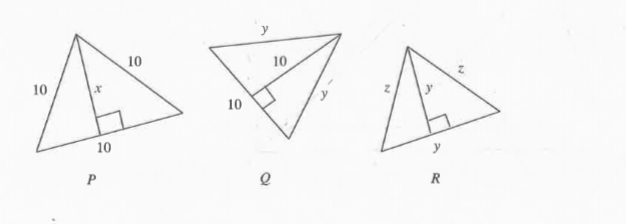Which of the following are not state functions?
(I) q+w
(II)q
(III) w
(IV) H−TS
I and IV
II, III and IV
I, II and III
II and III
The correct Answer is:D
To determine which of the given options are not state functions, we need to understand the definitions of state functions and path functions in thermodynamics.
1. Understanding State Functions:
- State functions are properties that depend only on the state of the system, defined by parameters such as temperature, pressure, and the amount of substance. They do not depend on how the system reached that state.
2. Identifying the Options:
- We have four options to evaluate:
- (I) q+w
- (II) q
- (III) w
- (IV) H−TS
3. Evaluating Each Option:
- Option (I) q+w:
- This expression represents the change in internal energy (ΔU). Internal energy is a state function because it depends only on the initial and final states of the system. Therefore, q+w is a state function.
- Option (II) q:
- Heat transfer (q) is a path function. It depends on the specific path taken during the process, not just the initial and final states. Therefore, q is not a state function.
- Option (III) w:
- Work done (w) is also a path function. Similar to heat transfer, it depends on the path taken to perform the work, not just the initial and final states. Therefore, w is not a state function.
- Option (IV) H−TS:
- The expression H−TS represents Gibbs free energy (G). Gibbs free energy is a state function because it depends only on the state of the system, defined by its temperature, pressure, and composition.
4. Conclusion:
- Based on the evaluations:
- Options (II) q and (III) w are not state functions.
- Options (I) q+w and (IV) H−TS are state functions.
Final Answer:
The options that are not state functions are (II) q and (III) w.
---
- State functions are properties that depend only on the state of the system, defined by parameters such as temperature, pressure, and the amount of substance. They do not depend on how the system reached that state.
- We have four options to evaluate:
- (I) q+w
- (II) q
- (III) w
- (IV) H−TS
- Option (I) q+w:
- This expression represents the change in internal energy (ΔU). Internal energy is a state function because it depends only on the initial and final states of the system. Therefore, q+w is a state function.
- Option (II) q:
- Heat transfer (q) is a path function. It depends on the specific path taken during the process, not just the initial and final states. Therefore, q is not a state function.
- Work done (w) is also a path function. Similar to heat transfer, it depends on the path taken to perform the work, not just the initial and final states. Therefore, w is not a state function.
- The expression H−TS represents Gibbs free energy (G). Gibbs free energy is a state function because it depends only on the state of the system, defined by its temperature, pressure, and composition.
- Based on the evaluations:
- Options (II) q and (III) w are not state functions.
- Options (I) q+w and (IV) H−TS are state functions.
The options that are not state functions are (II) q and (III) w.
Similar Questions
Knowledge Check
- Question 1 - Select One
Among the following, the set of parameters that represents path functions is
(A) q + w (B) q (C ) w (D) H - TSA(A), (B) and (C)B(B) and (C)C(A) and (D)D(B), (C) and (D). - Question 2 - Select One
Which of the following must be true?
(I) The area of triangle P.
(II) The area of triangle Q.
(III) The area of triangle R.
 AI = II = IIIBI lt II lt IIICI gt II lt IIIDIII lt I lt II
AI = II = IIIBI lt II lt IIICI gt II lt IIIDIII lt I lt II
Complete the following reaction : i.

ii.
iii.
iv. View Solution
View SolutionIdentify which of the following function represent simple harmonic motion.
(i) Y=AeIωt (ii) Y=ae−ωt
(iii) y=asin2ωt (iv) y=asinωt+bcosωt
(v) y=sinωt+bcos2ωtView SolutionDifferentiate the following functions w.r.t. x:
sec(px+q)View SolutionFind the truth values of the following compound statements :
(i) P∧(q∧r) (ii)(p∨q)∨r
(iii) p∧(q∨r) (iv)(p∧q)∨rView SolutionSelect the state functions among the following.
(i) U + PV (ii) S
(iii) q (iv) w
H - TSView SolutionLet ∗ be the binary operation defined on Q. Find which of the following binary operations are commutative
(i) a∗b=a−b,∀a,b∈Q (ii) a∗b=a2+b2,∀a,b∈Q
(iii) a∗b=a+ab,∀a,b∈Q (iv) a∗b=(a−b)2,∀a,b∈QView Solution
